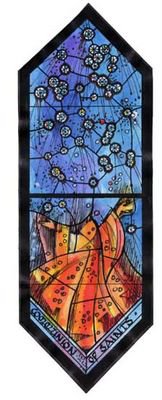She was born in Detroit, on the last day of December, 1891, to a family of German immigrants. Her mother died when she was young; her father remarried soon after, to a woman who turned out to be a stepmonster right out of Grimm's fairy tales; one day her father informed her and her sisters, "Your new mother doesn't like you, so you're going to have to leave." So she was yanked out of school at the fourth grade and put to work as a domestic.
Her employers were a highly educated, secular Jewish family who treated her with kindness and even, when she got older, tried to fix her up with one of the eligible young men in their family. But she eventually wound up marrying another German-American, a World War I veteran who'd been a medic overseas but was now working in a factory. Soon she found herself with two young children, and a husband whose wartime demons haunted him out of job after job. There was strife in the marriage, and at one point she'd left, only to come back after she discovered she was pregnant with her third child. Her children came down with illnesses like diptheria and scarlet fever. She herself was sick in bed much of the time. And then the Depression hit.
The family wound up in the rural middle of the state, sharecropping, although they had no experience farming and weren't particularly good at it. Life was hard physically and emotionally, and there was never enough money; the children had a change of clothing from day to day, and that was all. Meals consisted of potatoes, lard bread and canned goods from the family garden. Even at a time in American history when almost everyone was poor, this family's poverty was significant, and was a source of frustration and shame.
After many years, after the children had grown and the oldest had begun sending money back home, she and her husband were finally able to move to their own house, and a few acres of their own to farm. But by this time she had developed a serious case of diabetes, poorly managed in those times, and lived the life of an invalid, cared for by her two younger children. She was in a great deal of physical pain much of the time, and also endured the heartache of watching her youngest child develop a mental illness that eventually required hospitalization. On a happier note, she was able to experience the birth of a grandchild, after six years of waiting on the part of her oldest daughter and her husband. But just a couple of years later, on July 7th of 1962, she died of complications from diabetes.
Much of her story is a sad story. But she was a woman of humor, of imagination, of grit. She and her sisters, as young working women, used to get together and do silly things like hold costume parties. Even though she'd never gone beyond the 4th grade, she was an avid reader; ironically, one of her favorite books was about the adventures of an Edwardian-era coed during her first year of college. She loved art. She loved cooking, even though she had so little to cook with; she used to strive to fill every inch of shelf space in the family root cellar with canning, and noted that one of her happiest moments every year was when the last jar was put away for the year, and she could gaze with satisfaction on rows upon rows of her work. She was tolerant of other races and religions in a way that was novel for her time and place.
This woman was my maternal grandmother, Erna. I don't remember her at all, although my mother tells me she used to delight in holding me. I have a large birthmark on my hand that was very prominent and angry-red at birth; my mother was understandably upset, but my grandmother said, "She's been marked by God; she's God's special child." And she meant it.
Growing up, even though I don't remember my grandmother, I knew enough about her from the stories I'd heard to know she'd be pleased by my interest in academics and cooking; that she would have cheered my bravery in my dealings with things that frightened her, like thunderstorms and large animals; that, curious person that she was, she'd be amazed by the technological innovations of the end of the 20th century; that she'd have been pleased by the increasing empowerment of women. When I went off to college, I did so with the acute sense that I was carrying my grandmother with me -- her unfulfilled aspirations, her unquenched desire to learn, her delight in diversity and creativity.
So as I think about the great cloud of witnesses today, I imagine Grandmother Erna in their midst -- joyous, well, finally seeing the Beauty and Truth she desired face to face, praying for us all.
"Communion of Saints," stained glass, St. George's Episcopal Church, Dayton, OH


5 comments:
oh oh oh
I couldn't breath as I read this. It is a wonderful testimony about a wonderful woman.
Thank YOU for sharing it and carrying on her legacy of what it means to be a woman of God
What a lovely tribute.
What a beautiful story--what a remarkable woman.
Amazing story--and once again I'm ashamed at my whining about nothing.
This is really beautiful, LC. I feel the same way about my own grandmothers, actually. They went through a lot, without much help or support. All of our female forebears had the same sorts of experiences with "unfulfilled aspirations," for instance.
I'm glad you wrote a hymn to her. I'll just ride along with you, in fact, and pray for and think of my own great ladies.
Post a Comment